How to choose a wall clock
Choosing a perfect wall clock requires defining your needs and style , selecting the right type of clock ( analog, digital, pendulum ), considering materials and colors in harmony with your decor , choosing the type of movement ( quartz, mechanical, continuous ) adapted to your preferences. Follow these steps to find the perfect wall clock for your home.
Introduction
The art of interior decoration is based on a multitude of details, large and small, which help to create a unique and personal atmosphere in our living spaces. Among these elements, the wall clock occupies a special place . It goes well beyond its primary function of telling the time; it also embodies the style, character and elegance of a room . In this article, we will explore in depth the process of choosing a wall clock, highlighting the different aspects to consider to make this functional accessory a true aesthetic jewel within your interior.
The wall clock, whether discreet or bold , modern or classic , can serve as a centerpiece in a living room , kitchen , bedroom , or even an office . It embodies the passage of time, but it can also reflect your personality and the character of the room. During this article, we will explore how to choose the best wall clock to meet your needs while harmonizing with your decorating style . To do this, we will address the following points:
-
Define your needs and style
How to choose a wall clock that fits both your practical needs and the aesthetic of your space. -
Choose clock type
An exploration of the different types of wall clocks, their unique features and their impact on interior design. -
Materials and colors
How materials and colors influence the choice of your wall clock and its integration into the room. -
Clock movement
The different types of clock movements and their impact on precision and style. -
Maintenance tips
Tips to ensure the longevity and beauty of your wall clock over time.
By the end of this article, you will be armed with the knowledge to make an informed and aesthetically rewarding wall clock choice, helping to make your interior space both functional and aesthetically pleasing .
Let's start by exploring how to define your needs and style to choose the perfect wall clock .
Define your needs and style to choose a wall clock
When considering adding a wall clock to your space , it's essential to start by clearly defining your needs and thinking about your personal style. This first step will help you guide your choices and select a wall clock which not only displays the time , but which also becomes a centerpiece of your interior decoration .
-
Purpose of the wall clock:
First of all, ask yourself the main purpose of your wall clock. Do you want it to primarily serve a practical function, displaying the time clearly and accurately ? Or are you looking for a clock that adds an aesthetic dimension to your space , even if it's not necessarily the most accurate? Perhaps you are looking for a balance between these two aspects. By clearly defining your needs, you will be able to better direct your choice towards an analog, digital wall clock , or another type that meets your expectations.
-
Decoration style:
Each space has a unique personality when it comes to decoration, and your wall clock should fit harmoniously into this ensemble. ( Decorating idea with a wall clock ) Think about the predominant decoration style in the room where you plan to place the clock. Is your decoration modern , minimalist , vintage , classic , or rather eclectic ? The choice of clock should reflect this style. For example, a modern wall clock with clean lines and a minimalist design may suit contemporary decor , while a vintage clock with a distressed look may fit retro decor .
-
Size and location:
The size of your wall clock is a crucial factor to consider. It should be proportional to the space available and visible from the places where you want to view it. A clock that is too small risks getting lost in a large wall, while a clock that is too large can appear intrusive in a smaller space. Measure the intended location for your wall clock and consider visibility from key viewpoints in the room. In addition, the location must be chosen wisely so that the clock is a central element of the decoration.
By defining your needs and taking into account your decorating style, size and location, you will be better prepared to choose a wall clock that fits perfectly into your interior while meeting your practical expectations and aesthetic. The next step will be to explore the different types of wall clocks to find the one that best suits your criteria.
Choose clock type
When looking to select a wall clock, you will be faced with various types of clocks , each with their own characteristics and aesthetics. Understanding these options is essential to choosing the best one for your space.
-
Analog clocks:
Analog clocks are the most traditional and classic . They display the time with hands that rotate around a dial. These clocks have a timeless charm and can fit into various decor styles. However, they can be less accurate than digital clocks and sometimes require regular maintenance to ensure accuracy.
-
Advantages :
- Aesthetically appealing and timeless.
- Fits well into classic, vintage and traditional decors.
- Provide smooth needle movement.
-
Disadvantages :
- Less accurate than digital clocks.
- Occasionally require manual adjustment to maintain accuracy.
-
-
Digital clocks:
Digital clocks display the time in numbers , often with great visibility. They are modern and functional, suitable for contemporary spaces.
-
Advantages :
- Easy to read the time.
- High precision.
- Ability to display other information such as date or temperature.
-
Disadvantages :
- May appear less warm or decorative than analog clocks.
- Less versatile in terms of style.
-
-
Pendulums :
Pendulums are a specific category of analog clocks with a pendulum mechanism. They often evoke a traditional and elegant atmosphere.
-
Advantages :
- Elegant and decorative.
- The pendulum adds a touch of authenticity and movement.
- Fits well in classic and vintage interiors.
-
Disadvantages :
- Require careful maintenance to maintain balance accuracy.
- May be more fragile than standard clocks.
-
-
Special wall clocks :
Apart from traditional types, there are a wide variety of special wall clocks, including exposed gear clocks, LED clocks, artistic clocks, etc. These clocks are often unique conversation pieces that can be chosen for their visual impact.
-
Advantages :
- Create a unique and original atmosphere.
- Can be works of art in their own right.
-
Disadvantages :
- May not be as functional as traditional clocks.
- Their aesthetic may not suit all decors.
-
Choosing the type of clock affects the readability of the time and the overall style of your space. It is therefore important to think about your aesthetic preferences and practical needs before making your choice. Whether you choose an analog, digital, pendulum or special clock, make sure it fits harmoniously into your interior design while meeting your expectations in terms of functionality.
Materials and colors
Choosing materials and colors for your wall clock is a crucial step to ensure its harmonious integration into your interior decor. Each material and color can evoke a different atmosphere, so making thoughtful choices is essential.
-
Commonly used materials:
-
Drink
Wooden wall clocks offer a warm and natural feeling. They are versatile and can fit into a variety of styles, from rustic to modern. -
Metal
Metal wall clocks have a contemporary, industrial look. They are often lightweight and durable, ideal for modern spaces. -
Plastic
Plastic clocks are lightweight and affordable. They are available in a wide range of colors, making them suitable for a more playful or modern decor. -
Glass
Glass wall clocks look stylish and can create a mirror effect, visually expanding the space. They are ideal for elegant and contemporary spaces.
-
-
Importance of color and finish:
-
Color
The color of your clock should be in harmony with the rest of the room. If your decor is dominated by neutral tones, a colorful clock can add a touch of sparkle. Conversely, if your room is already colorful, a wall clock in neutral tones can balance the palette. -
Finishing
The finish of the clock can vary from matte to glossy, from distressed to modern. An old gold finish can evoke a retro vibe, while a glossy finish can add a contemporary touch. The finish should harmonize with the overall style of the room.
-
-
Matching other decorative elements:
The wall clock should not be an isolated element, but rather fit into the overall picture of the room. Here are some tips for matching your clock:
-
Room elements
Consider the furniture, curtains, cushions and other decorative elements in the room. Try to choose a clock that shares color, texture or style characteristics with these elements. -
Theme of the piece
If your room follows a particular theme, such as industrial style, bohemian style, or Scandinavian style, look for a wall clock that matches that theme. -
Arrangement and proportion
Make sure the clock is proportionate to the available wall space. Avoid it being overwhelmed by other elements or overly dominating.
-
In summary, choosing materials, colors and finishes for your wall clock is an important step in creating a cohesive ambiance in your space. Make sure your clock fits in with the rest of the room and contributes to the overall aesthetic of your interior decor.
Clock movement
A clock's movement is the internal mechanics that allows the clock to measure time. There are several types of movements , each having its advantages and disadvantages in terms of precision, operation and noise. Understanding these differences is essential to choosing the wall clock that best suits your needs.
-
Quartz movement
-
Advantages :
- High Accuracy: Quartz clocks are known for their precision. They are generally very reliable and only need periodic battery changes to maintain their accuracy.
- Low cost: Quartz clocks are often affordable.
-
Disadvantages :
- Movement per second: Quartz clocks typically have movement per second, meaning the second hand moves continuously rather than making discrete jumps. Some people may find this less visually pleasing.
- Ticking sound: Although ticking is often very quiet, it is present in most quartz clocks.
-
-
Mechanical movement
-
Advantages :
- Traditional Mechanics: Mechanical clocks operate with a complex mechanism that can be fascinating to observe. They are appreciated for their nostalgic charm.
- No ticking: Mechanical clocks generally do not make a ticking sound, making them silent.
-
Disadvantages :
- Less Accurate: Mechanical clocks are generally less accurate than quartz clocks and may require periodic adjustment.
- High Cost: High-quality mechanical clocks can be expensive to purchase and maintain.
-
-
Continuous motion movement
-
Advantages :
- Smooth Movement: Continuous motion clocks have a smooth sweep of the hands, which can be visually calming.
- Quiet: They generally do not produce a ticking noise.
-
Disadvantages :
- Variable Accuracy: The accuracy of continuous motion clocks can vary, and they may require more frequent adjustment than quartz clocks.
- Variable cost: The price of continuous movement clocks can vary depending on the quality and brand.
-
How to choose the movement that best suits your needs :
The choice of movement depends on your personal preference and the purpose of the clock in your space:
-
If precision is essential and you don't mind ticking, opt for a quartz clock.
-
If you're looking for traditional charm, a mechanical clock can be a great choice, but keep in mind that it may require regular maintenance.
-
If you prefer smooth, quiet movement, a continuous motion clock may be the solution.
Ultimately, your choice of movement will come down to your personal preference , noise tolerance, and budget. Whatever type of movement you choose, make sure it contributes to the overall feel of your space.
Maintenance tips
Regular maintenance of your wall clock is essential to ensure its longevity and proper functioning. Here are some tips for taking care of your wall clock effectively:
-
Dust and cleaning :
- Dust can accumulate on the clock face and hands, which can affect readability and appearance. Use a soft, dry cloth or soft-bristled brush to remove dust regularly.
- If necessary, use a slightly damp cloth to remove stubborn stains, avoiding direct contact with the internal mechanism.
-
Avoid shocks and vibrations :
- Shock or excessive vibration can unbalance the clock mechanism and impair its accuracy. Make sure the clock is securely attached to the wall and cannot fall.
- Avoid placing the wall clock near sources of vibration such as loud speakers or appliances.
-
Changing batteries :
- If your clock runs on batteries, replace them regularly following the manufacturer's recommendations. Use high quality batteries to ensure continuous operation.
- When replacing batteries, be sure to follow the polarity indicated in the battery compartment. Failure to observe correct polarity may damage the clock movement.
-
Minor repairs :
- In case of minor problems such as misaligned hands or loose nuts, it is possible to carry out minor repairs. ( How to Repair a Wall Clock ) However, if you are not comfortable with mechanics, it is It is best to call on a watchmaking professional.
- For mechanical clocks, a qualified professional can also provide the periodic maintenance necessary to maintain movement accuracy.
-
Pay attention to environmental conditions :
- Extreme variations in temperature and humidity can affect the operation of some clocks. Avoid exposing your clock to inappropriate environmental conditions.
- If your clock is intended for outdoor use, make sure it is designed to withstand the elements.
-
Consult the manufacturer's manual :
- Each wall clock may have specific maintenance needs. Consult the instruction manual provided by the manufacturer for advice specific to your model.
By following these maintenance tips, you can extend the life of your wall clock while maintaining its proper functioning and aesthetic appearance. Remember, if major problems arise or you have any doubts about maintaining your clock, it is best to consult a professional watchmaker for proper repairs or adjustments.
We hope this article has been useful to you in choosing a wall clock.
If you would like to receive our free e-book walls of time "THE ULTIMATE GUIDE" to choose the best wall clock for your home , other advice on interior decoration or be informed of exclusive offers on our products, do not do not hesitate to subscribe to our newsletter. We will regularly send you tips to improve the appearance of your home and keep you informed of current promotions in our Murs du Temps store. Thank you for choosing Murs du Temps for your interior decoration!


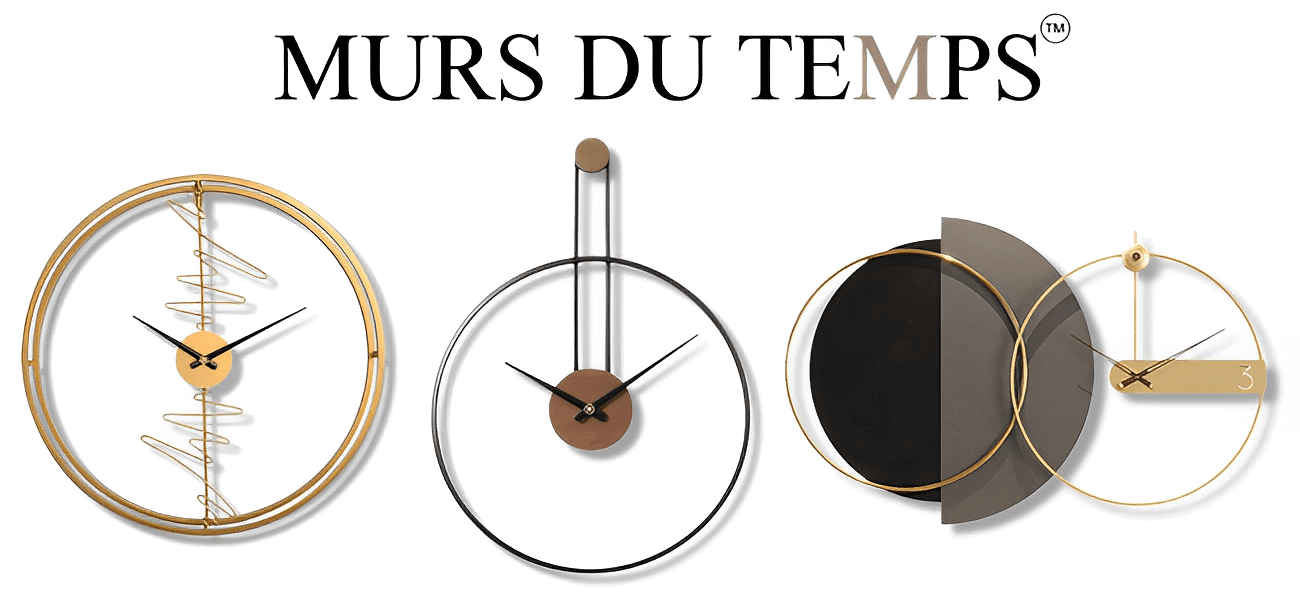
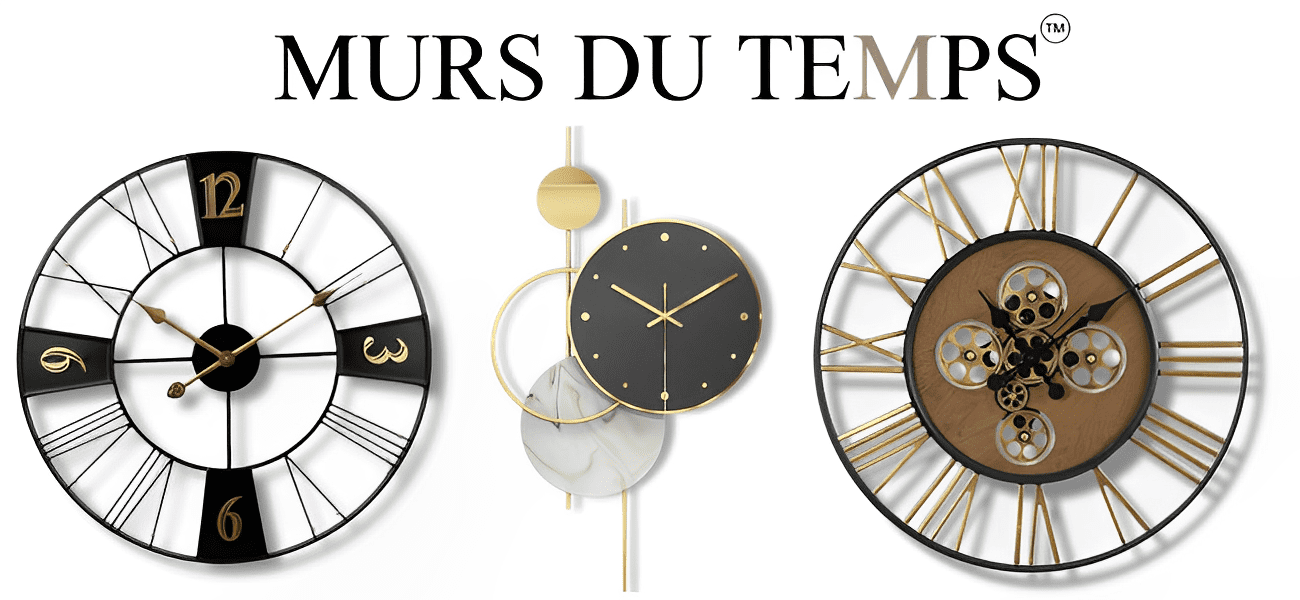
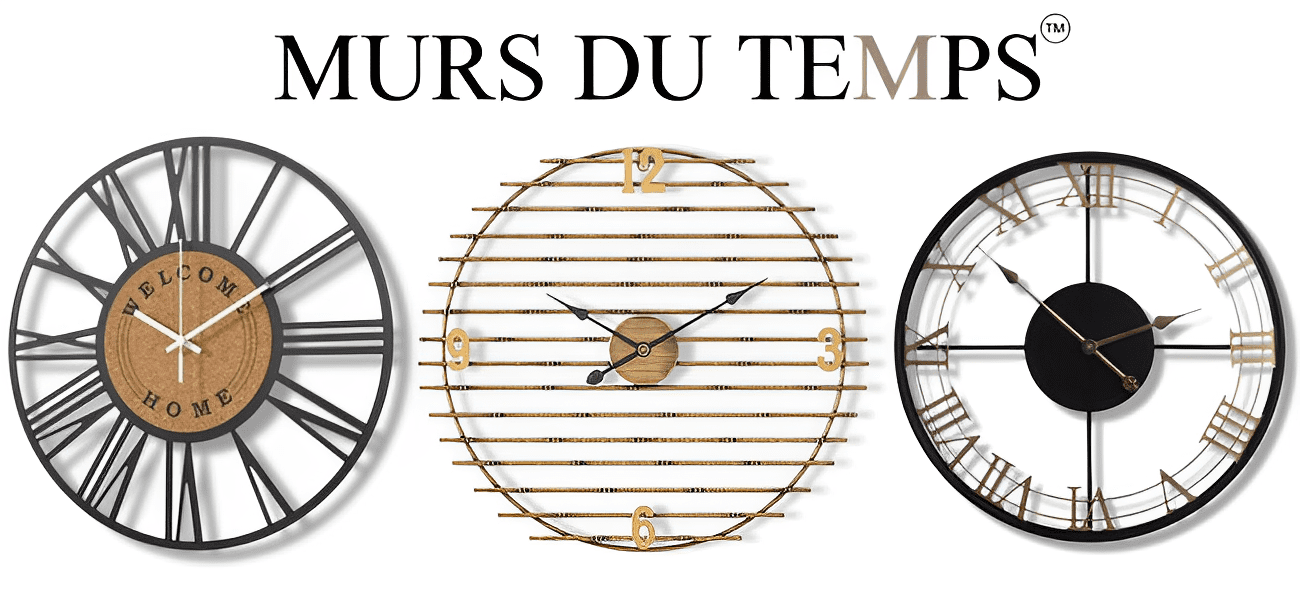
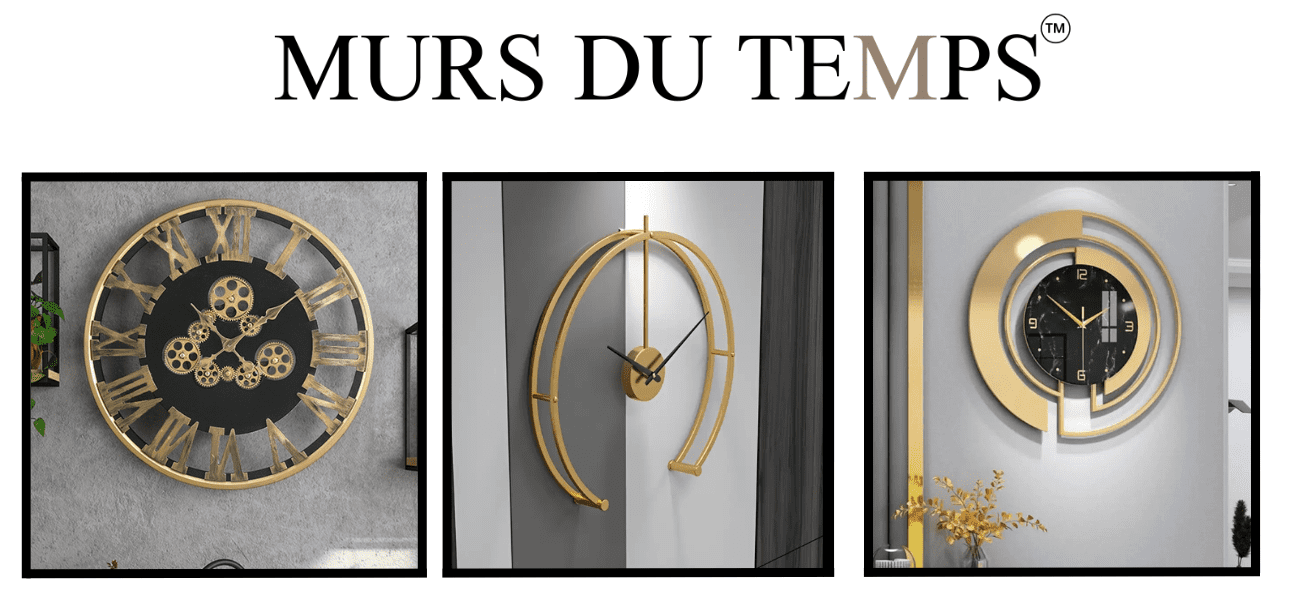
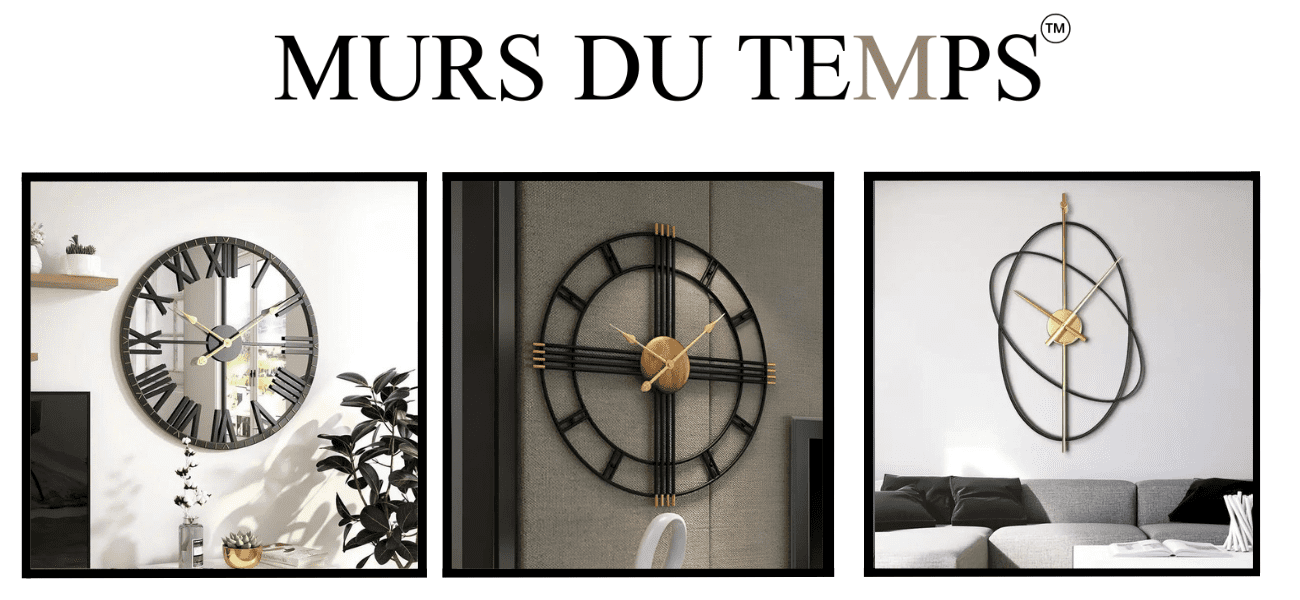




































Leave a comment
All comments are moderated before being published.
This site is protected by reCAPTCHA and the Google Privacy Policy and Terms of Service apply.